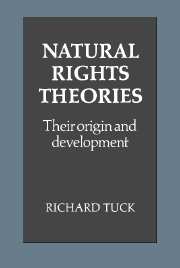Summary
The same period which saw the culmination of the Gersonian rights theory at Paris saw also the beginning of the movements which were quickly to lead to its abandonment. At Wittenberg in 1515–16, Martin Luther was writing a critique of Gerson's theology into his marginal notes on Tauler's sermons and preparing his seminal lectures on Paul's Epistle to the Romans. At Paris itself Francisco de Vitoria, the creator of the new scholasticism which was to dominate Catholic Europe in the sixteenth century, was a student from 1507 to 1522; while it was in the ten years from 1508 to 1518 that the basic and most significant works of Renaissance jurisprudence were composed or published. All of these developments were signs that the climate was no longer right for a theory of the Gersonian type, but the one which had probably the most substantial influence in the creation of the dominant ideologies of the sixteenth century was the last. The insights of the juridical humanists were taken up by Vitoria and his followers, but they were also taken up by the Reformed intellectuals of the mid-century, particularly the Calvinists. At some very deep level the attitude with which both Catholic and Calvinist faced the world at this period was the same, and at a much more superficial level some of their explicit arguments were almost identical. The Calvinist was generally, however, a much better humanist.
- Type
- Chapter
- Information
- Natural Rights TheoriesTheir Origin and Development, pp. 32 - 57Publisher: Cambridge University PressPrint publication year: 1979



